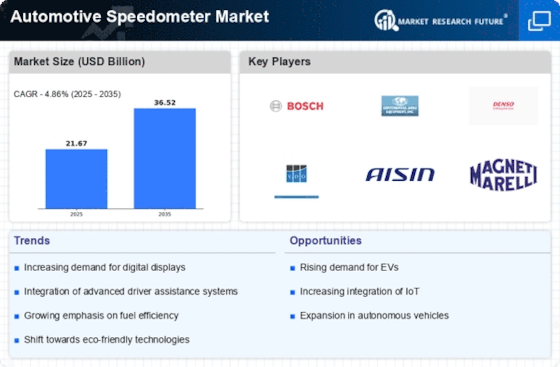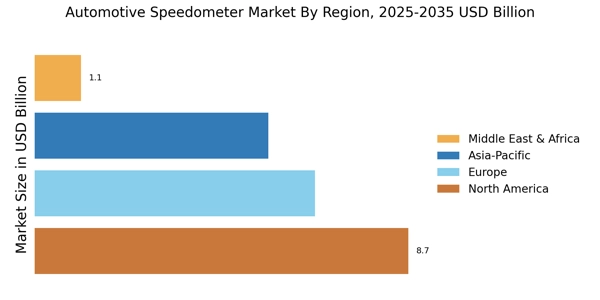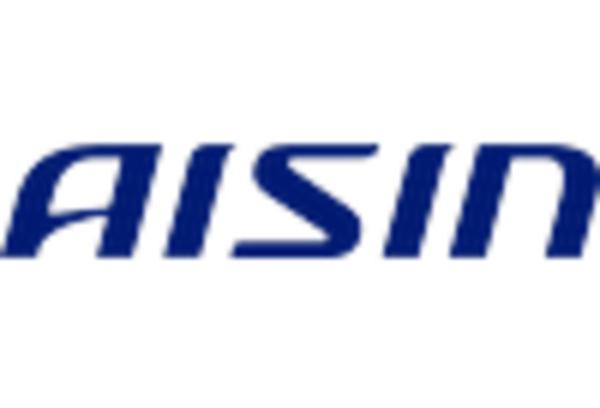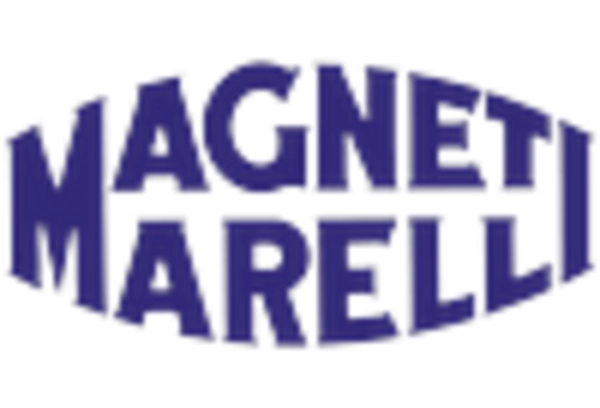Regulatory Compliance
Regulatory compliance plays a crucial role in shaping the Automotive Speedometer Market. Governments worldwide are implementing stringent regulations regarding vehicle safety and emissions, which necessitate the incorporation of advanced speedometer technologies. For instance, regulations mandating accurate speed readings and the integration of features like speed limit alerts are becoming more prevalent. This compliance not only ensures safety but also drives innovation within the industry. As a result, manufacturers are compelled to invest in research and development to meet these standards, thereby expanding their product offerings. The Automotive Speedometer Market is thus likely to see a rise in demand for speedometers that comply with these evolving regulations, fostering a competitive landscape.
Focus on Safety Features
Safety features are becoming a paramount concern in the Automotive Speedometer Market. With increasing awareness of road safety, consumers are seeking vehicles equipped with advanced safety technologies, including speedometers that provide alerts for over-speeding and other critical information. This focus on safety is reflected in market trends, where speedometers with integrated safety features are gaining traction. Manufacturers are investing in developing speedometers that not only display speed but also enhance overall vehicle safety through features like collision warnings and lane departure alerts. As a result, the Automotive Speedometer Market is likely to see a growing demand for speedometers that prioritize safety, thereby influencing product development strategies.
Rise of Electric Vehicles
The rise of electric vehicles (EVs) is significantly influencing the Automotive Speedometer Market. As the automotive landscape shifts towards electrification, the demand for speedometers that cater specifically to EVs is increasing. These speedometers often feature unique functionalities, such as energy consumption tracking and regenerative braking indicators, which are essential for EV drivers. Market analysts suggest that the growing adoption of EVs could lead to a substantial increase in the demand for specialized speedometers designed for these vehicles. This trend indicates a potential shift in the Automotive Speedometer Market, as manufacturers adapt their offerings to meet the needs of a changing consumer base.
Technological Advancements
The Automotive Speedometer Market is experiencing a surge in technological advancements, particularly with the integration of digital displays and smart features. These innovations enhance user experience by providing real-time data, such as fuel efficiency and navigation assistance. The market for digital speedometers is projected to grow significantly, with estimates suggesting a compound annual growth rate of over 6% in the coming years. This growth is driven by consumer demand for more sophisticated vehicle instrumentation, which not only improves safety but also adds to the overall driving experience. As manufacturers increasingly adopt these technologies, the Automotive Speedometer Market is likely to witness a shift towards more interactive and user-friendly interfaces.
Consumer Preferences for Digital Interfaces
Consumer preferences are shifting towards digital interfaces in the Automotive Speedometer Market. As vehicles become more technologically advanced, drivers increasingly favor digital speedometers that offer enhanced readability and additional functionalities. This trend is reflected in market data, indicating that digital speedometers accounted for a substantial share of the market in recent years. The appeal of customizable displays and integration with mobile applications further drives this preference. Manufacturers are responding by developing innovative digital solutions that cater to these consumer demands. Consequently, the Automotive Speedometer Market is likely to continue evolving, with a focus on creating speedometers that not only meet functional requirements but also align with modern aesthetic preferences.

















